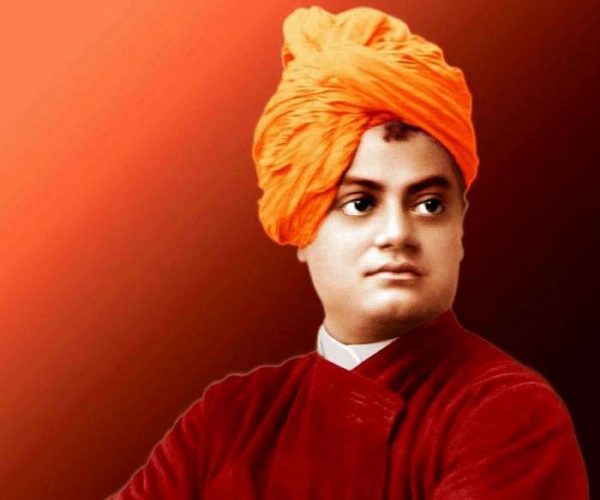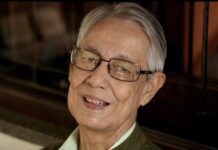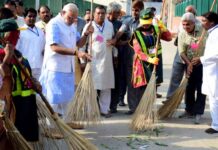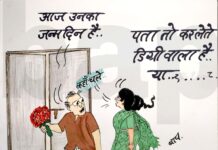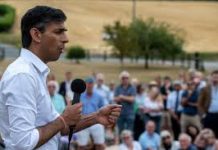— Neeraj Jain —
The title of this article, Rationalist and Scientific Vivekananda must have taken you by surprise. Propaganda by Hindu fundamentalists has ensured that Vivekananda’s real thoughts never reached the people. So today he is popularly known as a Hindutvawadi (i.e., fundamentalist Hindu) saint. Appropriating icons like Vivekananda to spread fundamentalist views in society is a very old strategy of Hindu fundamentalists, they have done this with Shivaji too and today they are trying to do the same with Dr. Ambedkar.
Ever since the Bharatiya Janata Party (BJP) came to power at the Centre in 2014, Hindu fundamentalists have been pushing ahead their communal agenda with great speed. They attack the very idea of India as a democratic, secular and socialist nation as enshrined in the Constitution, and have launched an all-out offensive to re-establish a society based on the Manusmriti and the caste system. They have intensified campaigns to intimidate minorities, and brazenly attack their places of worship. They now openly use the state machinery to deepen the communal divide.
A spectre of fascism looms over the country. At such a time, it is important to spread Vivekananda’s true thoughts and ideas among the people. Vivekananda was not a traditional Hindu monk as the Sangh Parivar makes him out to be. He was a modern ascetic with a scientific and materialist outlook. Here is a brief outline of some of his views.
Scientific and Rational Vivekananda
Vivekananda was an exceptionally scientific saint. He was unequivocal in saying:
We do not recognise such a thing as miracles. . . . Most of the strange things which are done in India and reported in the foreign papers are sleight-of-hand tricks or hypnotic illusions. They are not the performances of the wise men. (Volume 3 / Reports in American Newspapers / Miracles, 17 February 1894.)
In the same way, Vivekananda calls upon people not to believe in ghosts and superstitions. In a hard-hitting talk delivered at the Triplicane Literary Society, Madras, on 9 February 1897, he says:
The hundreds of superstitions that we have been hugging to our breasts for centuries . . . have to be weeded out. . . . Mystery mongering and superstition are always signs of weakness. These are always signs of degradation and of death. . . . Shame on humanity that strong men should spend their time on these superstitions, spend all their time in inventing allegories to explain the most rotten superstitions of the world. (Volume 3 / Lectures from Colombo to Almora / The Work Before Us.)
Blaming the Brahmins for the spread of superstitions among the masses, Vivekananda charged that they had a vested interest in keeping the masses steeped in backwardness so as to savagely exploit them. In a letter to Haridas Viharidas Desai on 22 August 1892, he wrote:
The people . . . have for their religion a certain bundle of local superstitions about eating, drinking, and bathing, and that is about the whole of their religion. Poor fellows! Whatever the rascally and wily priests teach them—all sorts of mummery and tomfoolery as the very gist of the Vedas and Hinduism (mind you, neither these rascals of priests nor their forefathers have so much as seen a volume of the Vedas for the last 400 generations)—they follow and degrade themselves. Lord help them from the Rakshasas in the shape of the Brahmins of the Kaliyuga. (Volume 8 / Epistles—Fourth Series / IX / Haridas Viharidas Desai, 22 August 1892.)
Vivekananda called upon the people to give up blind faith and believe in reason. In a talk on 24 May 1896 he said:
Why was reason given us if we have to believe? Is it not tremendously blasphemous to believe against reason? What right have we not to use the greatest gift that God has given to us? I am sure God will pardon a man who will use his reason and cannot believe, rather than a man who believes blindly instead of using the faculties He has given him. He simply degrades his nature and goes down to the level of the beasts—degrades his senses and dies. (Volume 6 / Lectures and Discourses / The Methods and Purpose of Religion.)
Vivekananda on the Caste System
Vivekananda took a firm stand against the barbaric and exploitative caste system. He called its hereditary nature ‘gibberish’ and asked for special efforts to spread education amongst the lowest castes. He implicitly called for elimination of caste. On 28 December 1893 he wrote to Haripada Mitra:
If anybody is born of a low caste in our country, he is gone for ever, there is no hope for him. Why? What a tyranny it is! . . . How many people really weep for the sorrows and sufferings of the millions of poor in India? . . . We do not touch them, we avoid their company! Are we men? Those thousands of Brahmanas—what are they doing for the low, down-trodden masses of India? ‘Don’t touch’, ‘Don’t touch’, is the only phrase that plays upon their lips! (Volume 5 / Epistles—First Series / VI / Haripada Mitra, 28 December 1893.)
More than British colonisation, Vivekananda held the caste system responsible for India’s appalling poverty and degradation. In February 1897, soon after his return to India from a hugely successful trip to America and Europe, he spoke at Kumbakonam, a village in Tamil Nadu, 160 miles from Madras and a stronghold of Brahmin fundamentalists:
Ay, my friends, I must tell you a few harsh truths. . . . (It is) not the English (but) we who are responsible for all our misery and all our degradation . . . Our aristocratic ancestors went on treading the common masses of our country underfoot, till they became helpless, till under this torment the poor, poor people nearly forgot that they were human beings. They have been compelled to be merely hewers of wood and drawers of water for centuries, so much so, that they are made to believe that they are born as slaves . . . Not only so, but I also find that all sorts of most demoniacal and brutal arguments, culled from the crude ideas of hereditary transmission and other such gibberish . . . are brought forward in order to brutalise and tyrannise over the poor all the more. (Volume 3 / Lectures from Colombo to Almora / The Mission of the Vedanta.)
In a letter written to his disciples on 24 January 1894, Vivekananda went even further and implicitly called for bringing down the caste system:
My idea is to bring to the door of the meanest, the poorest, the noble ideas that the human race has developed both in and out of India, and let them think for themselves. . . . ‘Liberty of thought and action is the only condition of life, of growth, and well-being.’ Where it does not exist, the man, the race, the nation must go down.
Caste or no caste, creed or no creed, any man, or class, or caste, or nation, or institution which bars the power of free thought and action of an individual—even so long as that power does not injure others—is devilish and must go down. (Volume 5 / Epistles—First Series / VII / Madras Devotees, 24 January 1894.)
Vivekananda on Religion
The definition that Vivekananda gave for religion is simply beautiful:
To devote your life to the good of all and to the happiness of all is religion. (“Vivekananda the Revolutionary”, http://americanvedantist.org.)
An untraditional Hindu saint, his views on religion are completely opposed to the propaganda of Hindu fundamentalists. Vivekananda held that all true religions are equal holding the same ideals,
The ideal of all religions . . . is the same—the attaining of liberty and cessation of misery. (Volume 4 / Addresses on Bhakti-Yoga / The Ishta.)
In December 1966, the United Nations General Assembly adopted the International Covenant on Civil and Political Rights. Article 18 of this Covenant recognises that everyone shall have the right to have or adopt a religion of his/her choice; and that everyone shall have the freedom to manifest his/her religion through worship, observance and practice. Seventy years before the world’s nations adopted this Covenant, Vivekananda preached respect and dignity for all religions:
What is needed is a fellow-feeling between the different types of religion, seeing that they all stand or fall together, a fellow-feeling which springs from mutual esteem and mutual respect. (Volume 2 / Jnana-Yoga / The Necessity of Religion.)
Vivekananda treads where Hindu fundamentalists wouldn’t dare. He called Mohammed the ‘Messenger of equality’ and also ‘the Prophet of equality, of the brotherhood of man.’ (Volume 4 / Lectures and Discourses / The Great Teachers of the World.) In a letter to Mohammed Sarfaraz Husain written on 10 June 1898, he wrote:
If ever any religion approached to this equality in an appreciable manner, it is Islam and Islam alone. (Volume 6 / Epistles—Second Series / CXLII / Sarfaraz Husain, 10 June 1898.)
Vivekananda emphasised that if this country is to progress, if India in the future is to rise ‘glorious and invincible’, there must not only be cooperation among all religions, but their confluence. In the above mentioned letter to Sarfaraz Husain, he further wrote:
I am firmly persuaded that without the help of practical Islam, theories of Vedantism, however fine and wonderful they may be, are entirely valueless to the vast mass of mankind…. For our own motherland a junction of the two great systems, Hinduism and Islam—Vedanta brain and Islam body—is the only hope.
Vivekananda warned people against religious fundamentalists’ attempts to propagate all kinds of myths and divide Hindus and Muslims. One such false propaganda is about forcible conversions. Vivekananda exposed the falsity of this propaganda in at least two letters, one written to Pandit Shankarlal of Khetri on 20 September 1892, and another to Haridas Viharidas Desai in November 1894, whose essence is: In this country, religious conversions have not taken place because of atrocities by Christians and Muslims, but because of atrocities by the upper castes. (Volume 5 / Epistles—First Series / II; and Volume 8 / Epistles—Fourth Series / XXXIV)
Today the RSS and its affiliates pursue a vicious campaign of low-intensity but sustained violence against Muslims and Christians to terrorise and intimidate them, so that they either convert ‘back’ to Hinduism or internalise their subordinate status and accept that they are living in India at the mercy of the ‘Hindu majority’. The teachings of Vivekananda exactly oppose all that the Sangh Parivar stands for.
When Vivekananda preached equal respect for all communities, he clarified that this did not mean tolerance. On the contrary, he berated tolerance as blasphemy:
Toleration means that I think that you are wrong and I am just allowing you to live. Is it not a blasphemy to think that you and I are allowing others to live? (Volume 2 / Practical Vedanta and Other Lectures / The Way to the Realisation of a Universal Religion.)
And so, he added:
Our watchword, then, will be acceptance, and not exclusion. . . . I accept all religions that were in the past, and worship with them all; I worship God with every one of them, in whatever form they worship Him. I shall go to the mosque of the Mohammedan; I shall enter the Christian’s church and kneel before the crucifix; I shall enter the Buddhistic temple, where I shall take refuge in Buddha and in his Law. (Ibid.)
He criticised the imposition of religious values of one community on others. At this time when religious fanatics have launched a violent campaign to force the vegetarian eating habits of the Brahmin minority on the entire people, especially Muslims, it is important to recall Vivekananda’s wise words:
We leave everybody free to know, select, and follow whatever suits and helps him. Thus, for example, eating meat may help one, eating fruit another. Each is welcome to his own peculiarity, but he has no right to criticise the conduct of others … much less to insist that others should follow his way…. The terrible mistake of religion was to interfere in social matters…. What business had the priests to interfere (to the misery of millions of human beings) in every social matter? (Volume 4 / Writings: Prose / What We Believe In, 3 March 1894.)
Vivekananda’s Call to the Youth
Vivekananda travelled across the country, calling the youth to sacrifice and work for uplifting the poor, as it was their duty to society:
Who cares whether there is a heaven or a hell, who cares if there is a soul or not, who cares if there is an unchangeable or not? Here is the world, and it is full of misery. Go out into it as Buddha did, and struggle to lessen it or die in the attempt. Forget yourselves; this is the first lesson to be learnt, whether you are a theist or an atheist, whether you are an agnostic or a Vedantist, a Christian or a Mohammedan. (Volume 2 / Practical Vedanta and Other Lectures / Practical Vedanta: Part IV.)
Vivekananda was confident that the youth of India would accept the challenge and join him in thousands for this cause of serving mankind:
I know for certain that India requires the sacrifice of her highest and best … A few young men have jumped in the breach, have sacrificed themselves. They are a few; we want a few thousands of such as they, and they will come. (Volume 6 / Epistles—Second Series / LI / Dr. Nanjunda Rao, 30 November 1894.)
Vivekananda’s whole life was a saga of relentless effort to create awareness and mobilise the young men and women of India to sacrifice, go out among the masses, uplift them, organise them, and build a new society that would be free from all kinds of exploitation. He was confident about it:
Believe me, from the shedding of our lifeblood will arise gigantic, heroic workers and warriors of God who will revolutionise the whole world. (Swami Nikhilananda, “In Northern India” in Vivekananda A Biography.)
courtesy: janataweekly.org
Discover more from समता मार्ग
Subscribe to get the latest posts sent to your email.

